

Genetics. Food. Potable Water. Energy. Built Environment. Arts & Entertainment. Manufactured Goods. Knowledge & Learning. Robots in workplace 'could create double the jobs they destroy' A Quantum Computing Breakthrough is Set to Transform Our World. Emerging Leaders Quantum computers are, unarguably, the next great evolutionary step in the development of computing tech.
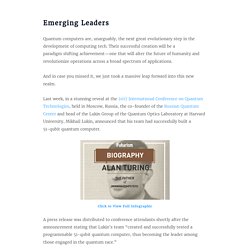
Their successful creation will be a paradigm shifting achievement—one that will alter the future of humanity and revolutionize operations across a broad spectrum of applications. And in case you missed it, we just took a massive leap forward into this new realm. Last week, in a stunning reveal at the 2017 International Conference on Quantum Technologies, held in Moscow, Russia, the co-founder of the Russian Quantum Center and head of the Lukin Group of the Quantum Optics Laboratory at Harvard University, Mikhail Lukin, announced that his team had successfully built a 51-qubit quantum computer.
A press release was distributed to conference attendants shortly after the announcement stating that Lukin’s team “created and successfully tested a programmable 51-qubit quantum computer, thus becoming the leader among those engaged in the quantum race.” Physicists create new form of light. Try a quick experiment: Take two flashlights into a dark room and shine them so that their light beams cross.
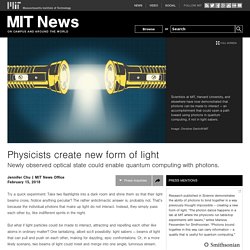
Notice anything peculiar? The rather anticlimactic answer is, probably not. Future Health Insurance: Preparing for Dr. Big Brother. According to OECD predictions, exceeding budgets on health spending remains an issue for OECD countries.
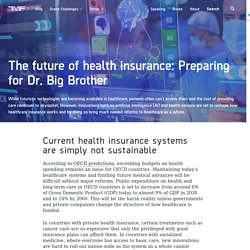
Maintaining today’s healthcare systems and funding future medical advances will be difficult without major reforms. Public expenditure on health and long-term care in OECD countries is set to increase from around 6% of Gross Domestic Product (GDP) today to almost 9% of GDP in 2030 and to 14% by 2060. This will be the harsh reality unless governments and private companies change the structure of how healthcare is funded. In countries with private health insurance, certain treatments such as cancer care are so expensive that only the privileged with good insurance plans can afford them.
In countries with socialized medicine, where everyone has access to basic care, new innovations are hard to roll out nation-wide as the system as a whole cannot afford it. Could macro-insurance become a reality? The one-policy-covers-all-risk approach. Robots Could Soon Have More Sensitive Skin Than You Do. The coupling of solar panel technology with artificial skin is a huge breakthrough, but Dahiya and his team aren't stopping there.
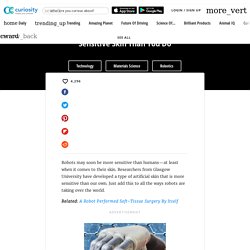
They hope to bring cheaper prosthetics to market, and eventually create "an entirely energy-autonomous prosthetic limb," Dahiya told Engadget. Down the line, that may mean smarter, more sensitive robots. "Skin capable of touch sensitivity also opens the possibility of creating robots capable of making better decisions about human safety," Dahiya explained in the Glasgow University press release. The Maker Movement Can Help Catalyze a Manufacturing Renaissance. Amid the hoopla of celebrating a deal to save 800 jobs at a Carrier Corp. factory in Indiana last month, President-elect Donald Trump promised to usher in a “new industrial revolution“—one that sounded as much like a social awakening as a manufacturing one.
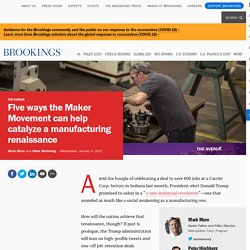
How will the nation achieve that renaissance, though? If past is prologue, the Trump administration will lean on high-profile tweets and one-off job-retention deals combined with moves to renegotiate some trade deals to give U.S. workers a leg up. And maybe those gestures will help. However, there is another way to think about touching off an industrial revival in America that brings back economic growth, opportunity, and decent jobs for blue-collar workers. That approach would embrace the Maker Movement as a deeply American source of decentralized creativity for rebuilding America’s thinning manufacturing ecosystems.
To help with that, here are five ideas for getting started: If you want to save the world, veganism isn’t the answer. Veganism has rocketed in the UK over the past couple of years – from an estimated half a million people in 2016 to more than 3.5 million – 5% of our population – today.
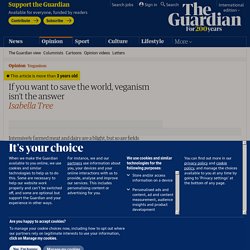
Influential documentaries such as Cowspiracy and What the Health have thrown a spotlight on the intensive meat and dairy industry, exposing the impacts on animal and human health and the wider environment. But calls for us all to switch entirely to plant-based foods ignore one of the most powerful tools we have to mitigate these ills: grazing and browsing animals. Rather than being seduced by exhortations to eat more products made from industrially grown soya, maize and grains, we should be encouraging sustainable forms of meat and dairy production based on traditional rotational systems, permanent pasture and conservation grazing.
The animals live in natural herds and wander wherever they please. Economically Viable Large Scale Space Colonisation Gets Closer. Al Globus and Joe Strout have an analysis that space settlements in low (~500 km) Earth equatorial orbits may not require any radiation shielding at all.

"If you can’t beat a machine, become one." (Istvan) iStock A battle for the "soul" of the global economy is underway.
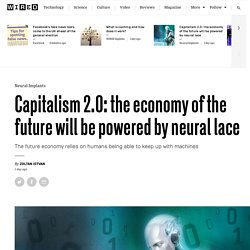
The next few decades will likely decide whether capitalism survives or is replaced with a techno-fuelled quasi-socialism where robots do most of the jobs while humans live off government support, likely a designated guaranteed or basic income. Many experts believe wide-scale automation is inevitable. Will humans go the way of horse labor? The debate over what technology does to work, jobs and wages is as old as the industrial era itself.

In the second decade of the 19th century, a group of English textile workers called the Luddites protested the introduction of spinning frames and power looms, machines of the nascent Industrial Revolution that threatened to leave them without jobs. Since then, Each new burst of technological progress has brought with it another wave of concern about a possible mass displacement of labor. On one side of the debate are those who believe that new technologies are likely to replace workers. "I Don’t Believe Robots Will Eat All the Jobs" Image: Tobias Higbie THE ROBOT TWEETSTORMS by @PMARCA.
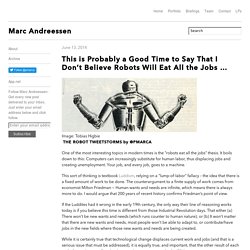
How To Make the Most of The New Synthetic Biology Era? We are entering an era of directed design in which we will expand the limited notion that biology is only the ‘study of life and living things’ and see biology as the ultimate distributed, manufacturing platform (as Stanford bioengineer, Drew Endy, often says). This new mode of manufacturing will offer us unrivaled personalization and functionality. New foods. Smart Dust Is Coming: New Camera The Size of a Grain of Salt. Miniaturization is one of the most world-shaking trends of the last several decades. Computer chips now have features measured in billionths of a meter. Sensors that once weighed kilograms fit inside your smartphone.
But it doesn't end there. Researchers are aiming to take sensors smaller—much smaller. In a new University of Stuttgart paper published in Nature Photonics, scientists describe tiny 3D printed lenses and show how they can take super sharp images. This allows for a variety of designs to be tested to achieve the finest quality images. Blockchains Could Help Restore Trust in Food. Companies around the world are exploring blockchain, the technology underpinning digital currency bitcoin. In this Blockchain unleashed series, we investigate the many possible use cases for the blockchain, from the novel to the transformative. If the food industry is not in crisis, it certainly contains an increasing level of complexity and associated risks.
A recent analysis suggested 50% of US food production is wasted, with global estimates above 30%. Retailers want perfect produce, leading to wastage occurring throughout the food supply chain. They also seek low prices, leading to industrialisation of processes. Food scares such as mad cow disease (BSE) and cross contamination mean many consumers have less trust in their food, increasingly seeking information on authenticity and production practices.
Solar-Complementary Solutions Coming For High Latitude Countries. In places as diverse as Chile, Abu Dhabi, parts of India or the islands of Hawai'i, recent auctions for new electricity generation capacity have demonstrated that solar can beat fossil fuels on price - no subsidy or special favours required. Towards the end of last year, Shell CEO Ben van Beurden made a little-noticed remark. He said that solar would become the "dominant backbone" of the world's energy system. He didn't give a date for his prediction, or indeed define what 'dominant' means, but he accepted that the sun will eventually provide the cheapest energy source across almost all of the world. UC Researcher Aims To 3D-Print Synthetic Wood. UC researcher aims to 3D-print synthetic wood A University of Canterbury researcher has won Government funding to explore the potential of 3D-printing live plant cells (bio-printing) to create synthetic wood.
Associate Professor David Leung is working on creating a new, sustainable industry for synthetic wood manufacture through 3D bio-printing live plant cells that could vastly reduce the need for tree harvesting. Plasma Wings Could Change Aeroplane Design & Flight. UK Copyright Extension Challenges 3D Printing. A recent extension of UK copyright for industrially manufactured artistic works represents "a direct assault on the 3D printing revolution," says Pirate Party founder Rick Falkvinge. The UK government last month extended copyright for designs from 25 years to the life of the designer plus 70 years.
In practice, this is likely to mean a copyright term of over 100 years for furniture and other designed objects. Status Quo + Robots Will Create A 'Permanent Underclass' (Pew) Robots are taking all the jobs. The Future Of Quantum Computing, AI & More. Putting A Computer In Your Brain Is No Longer Science Fiction. AIIB Aims to Build a Green Future. People watched closely when China launched the Asian Infrastructure Investment Bank (AIIB) last year. Bauwens: 4 Collaborative Economy Scenarios.